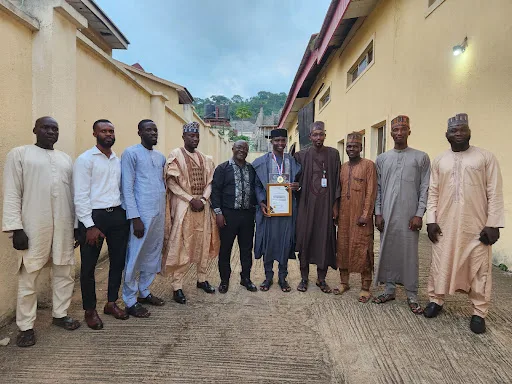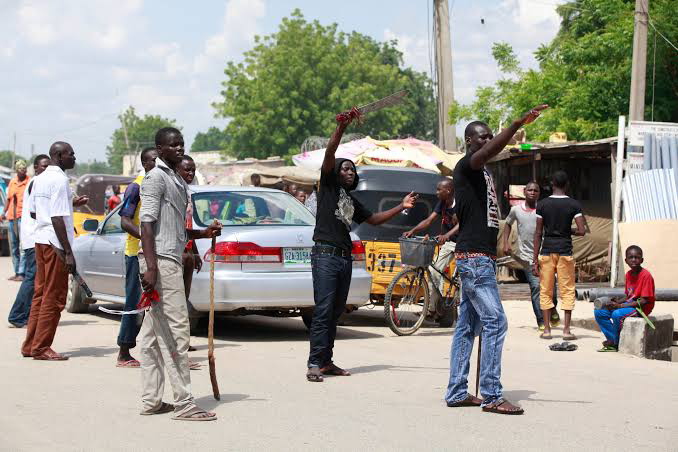El-Faruq Foundation Honours Umaru Kirawa as Humanitarian Journalist of the Year
BY NEWS DESK
The recognition of Umaru Yakubu Kirawa as Humanitarian Journalist of the Year by the El-Faruq Foundation reflects the critical role of journalism in addressing human suffering. This award explores the significance of Kirawa's achievements, the context of humanitarian journalism, and the impact of individual stories in shaping public consciousness. The discussion will illuminate the foundational principles that guide humanitarian journalism while considering the future directions in this vital field.
Umaru Yakubu Kirawa has distinguished himself as a prominent voice in the realm of humanitarian journalism. His commitment to exposing issues that affect marginalized communities has garnered him well-deserved recognition. The El-Faruq Foundation's award ceremony not only highlighted his individual contributions but also served as a reminder of the essential role journalists play in society. Kirawa's work exemplifies courage, integrity, and a dedication to truth in reporting.
The field of humanitarian journalism has evolved over time, drawing attention to issues often overlooked by mainstream media. It is rooted in the belief that journalism can facilitate understanding and empathy towards marginalized populations. This subset of journalism focuses on storytelling that emphasizes the human experience, often bringing to light the struggles faced by those in crisis. In recent years, various conflicts have provided a fertile ground for humanitarian journalism to flourish. Stories of people affected by displacement, famine, and war have underscored the urgency of this profession.
Umar A. Ahmad, the Founder and Executive Director of El-Faruq Foundation, has played a pivotal role in promoting humanitarian initiatives. His organization focuses on alleviating suffering through humanitarian projects and advocacy. Ahmad’s recognition of Kirawa's work highlights the intersection of journalism and humanitarianism. It demonstrates how dedicated reporting can influence positive change. By celebrating figures like Kirawa, Ahmad aims to inspire others in the media to explore the humanitarian dimensions of their reporting.
The award ceremony for Kirawa drew individuals from various spheres of life, including family, friends, and colleagues, emphasizing the broad support for his endeavors. This gathering was not simply a celebration of one individual but showcased the growing network of professionals aimed at making a difference through journalism. As attendees shared their experiences of Kirawa's impact, a collective narrative emerged, highlighting the power of storytelling in addressing societal challenges.
A crucial aspect of Kirawa’s work is his focus on issues that often get overshadowed in mainstream discourse. His reporting shines a light on the human side of crises – the stories, struggles, and resilience of individuals. By doing so, he challenges the apathy that can arise from consuming news laden with statistics and abstract narratives. Such an approach fosters empathy and encourages action. Kirawa's feature stories have served not only to inform but also to galvanize support for humanitarian causes.
Kirawa's achievements can be seen in the context of a broader movement towards understanding journalism as a tool for social change. Influential journalists such as Anna Politkovskaya and Martin Bell have similarly highlighted human suffering and called for accountability in conflict situations. These precedents set the stage for current journalists like Kirawa, who navigate the dual responsibilities of reporting the truth and advocating for those without a voice.
The landscape of journalism is experiencing rapid changes, largely due to technological advances and shifts in audience consumption patterns. Social media platforms have become essential tools for disseminating stories quickly and widely. This offers an unprecedented opportunity for humanitarian journalists to reach a global audience and raise awareness about pressing issues. However, it also presents challenges, including the spread of misinformation and the risk of oversimplification of complex human narratives.
As we consider the future of humanitarian journalism, it is essential to recognize the enduring need for authenticity and empathy in reporting. Journalists must remain committed to ethical standards and strive for accurate representation of the communities they cover. Initiatives like the one led by El-Faruq Foundation serve as reminders that recognition can motivate journalists to continue their significant work, even amid adversity.
Kirawa was a budding journalist, eager to make a name for himself in the competitive world of media. As a young reporter at News Central Television, he was determined to climb the ranks and establish himself as a respected voice in the industry.
On his part, Amadin Uyi, Abuja Bureau Chief and Head of Northern Operations at News Central Television, took notice of Kirawa's work. Impressed by his dedication and drive, Amadin commended Kirawa on his zeal in journalism.
"Kirawa, I have been following your work closely and I must say, I am impressed by your passion and commitment to journalism," Amadin said. "You have a natural talent for storytelling and a keen eye for important issues. Keep up the good work."
Kirawa was elated to receive such praise from a respected figure in the industry. He had always looked up to Amadin and admired his work ethic and professionalism. To receive recognition from someone of Amadin's caliber was a huge honor for Kirawa.
Encouraged by Amadin's words, Kirawa vowed to redouble his efforts as an upcoming journalist. He took on more challenging assignments, sought out new sources, and delved deeper into his stories. He was determined to prove himself and make a name for himself in the industry.
As Kirawa continued to grow and develop as a journalist, he never forgot the words of encouragement from Amadin. He remained focused on his goals and worked tirelessly to achieve them. And, as he climbed the ranks at News Central Television, he always remembered the advice and guidance he had received from Amadin.
News Central’s Northeast Correspondent.
Kirawa's hard work and dedication paid off. He became a respected and established journalist in his own right, with a reputation for insightful reporting and compelling storytelling. And, he always looked back on the day when Amadin had commended his zeal in journalism as the moment that ignited his passion and set him on the path to success.
The recognition of Umaru Yakubu Kirawa as Humanitarian Journalist of the Year represents not only an individual’s accomplishments but also the broader impact of humanitarian journalism. As the media landscape evolves, the importance of stories that humanize crises becomes ever more critical. Kirawa’s contributions exemplify the potential of journalism to foster understanding and inspire action.
The collective efforts of organizations like the El-Faruq Foundation and the commitment of journalists reinforce the notion that storytelling is a powerful catalyst for change.











Comments
Post a Comment